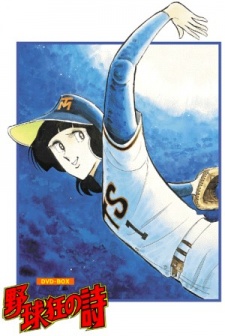Unexpected Teammates

This May, Fox canceled sports drama Pitch despite great reviews from Hollywood and baseball insiders alike. Although the network poured millions into the production, the USA’s sagging interest in baseball and young viewers’ exodus from network television doomed the show before it could blossom. Across the ocean, however, anime series similar to Pitch have thrived for years. One such show is Yakyū-kyō no Uta, a less celebrated yet successful manga and anime produced throughout the 1970s.
Pitch tells the story of Ginny Baker, a modern Jackie Robinson trailblazing in a profession historically hostile to women. Yakyū-kyō no Uta, on the other hand, follows Yūki Mizuhara, a veterinary student drafted by the lowly Tokyo Mets as a publicity stunt. When the Mets realize her potential, they help her develop into the team’s closer, and she becomes a rallying point to lift the team out of last place in Nippon Professional Baseball. Swap out the 1977 Tokyo Mets for the 2016 San Diego Padres, and the plot of Pitch closely resembles this classic baseball anime.
Stumbling into American Feminism
Despite being nearly 40 years older, Yakyū-kyō no Uta stumbles upon a stronger American feminist message than its recent counterpart. Throughout Pitch, Ginny perpetually defends her position and her talents through hard work and public grooming, as if the audience couldn’t be trusted in assuming that a woman could play professional baseball. Yūki doesn’t face that challenge and instead assimilates with the rest of the ballplayers once she proves she can strike out batters.
Since the production team geared Yakyū-kyō no Uta for children, they likely didn’t have to add the sexual and social nuances that the writers for Pitch needed to include to appeal to an older audience. Ginny is both black and pretty, making her instant celebrity complicated by sexism and racial injustice, while Yūki’s primary concern is giving up her studies to play a children’s game. While Ginny faces more realistic struggles than Yūki, Yūki’s Japan accepts female ballplayers much more easily than Ginny’s America, giving her a status and power that Ginny may never achieve. If Pitch wants to make Ginny Baker a stronger role model, it should consider using the innocent and childlike perspective Yakyū-kyō no Uta frames for Yūki.
The Future of Pitch?
Like Pitch, Nippon Animation’s Yakyū-kyō no Uta got only a short run. However, a popular children’s manga and a live-action film preceded the series and an animated movie, live action drama, and two manga reboot followed it in the 2000s. In the age of streaming and endless cable channels, Pitch’s cancellation does not necessarily signal its demise. With great reviews and a small-but-loyal fanbase, there’s a chance that Netflix, Hulu, HBO, or even ESPN will pick it up and continue the story, much like DirecTV did with Friday Night Lights after its first cancellation. And if someone chooses to restart the project, they’ll have a 40-year old sister show to scout from the bleachers.